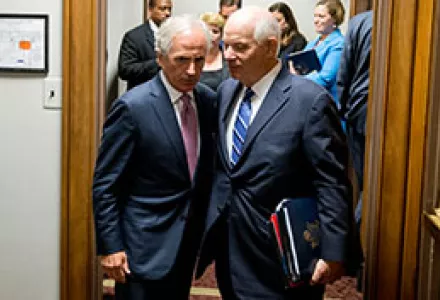The “Joint Comprehensive Plan of Action”—the nuclear agreement between the P5+1 and Iran—will enter the implementation phase within months. US policy makers must now consider how best to strengthen the accord as implementation approaches, and in how best engage Iran as implementation proceeds. In this discussion, nonproliferation experts William H. Tobey and Matthew Bunn will discuss how to strike an effective balance between cooperation and confrontation in dealing with Iran on the nuclear agreement and beyond. The discussion will be followed by Q&A with the audience. Light refreshments provided.
Martin B. Malin is the Executive Director of the Project on Managing the Atom at the Belfer Center. His research focuses on arms control and nonproliferation in the Middle East, U.S. nonproliferation and counter-proliferation strategies, and the security consequences of the growth and spread of nuclear energy. His recent work includes a review of strategies for preventing illicit trade in nuclear-related technology, an examination of Israeli leaders’ perception of the threat of a nuclear-armed Iran, and an analysis of the regional conditions conducive to the creation of a WMD-free zone in the Middle East.
William Tobey is a Senior Fellow at the Belfer Center. He was most recently Deputy Administrator for Defense Nuclear Nonproliferation at the National Nuclear Security Administration. There, he managed the U.S. government's largest program to prevent nuclear proliferation and terrorism by detecting, securing, and disposing of dangerous nuclear material. Mr. Tobey also served on the National Security Council Staff in three administrations, in defense policy, arms control, and counter-proliferation positions. He has participated in international negotiations ranging from the START talks with the Soviet Union, to the Six Party Talks with North Korea. He also has extensive experience in investment banking and venture capital.
Matthew Bunn is a Professor of Practice at Harvard University's John F. Kennedy School of Government. His research interests include nuclear theft and terrorism; nuclear proliferation and measures to control it; the future of nuclear energy and its fuel cycle; and policies to promote innovation in energy technologies. Before joining the Kennedy School in January 1997, he served for three years as an adviser to the Office of Science and Technology Policy, where he played a major role in U.S. policies related to the control and disposition of weapons-usable nuclear materials in the United States and the former Soviet Union, and directed a secret study for President Clinton on security for nuclear materials in Russia.

